Roger Clemens: Five Tainted Moments of Greatness
Travis CookeCorrespondent IAugust 24, 2010Roger Clemens: Five Tainted Moments of Greatness
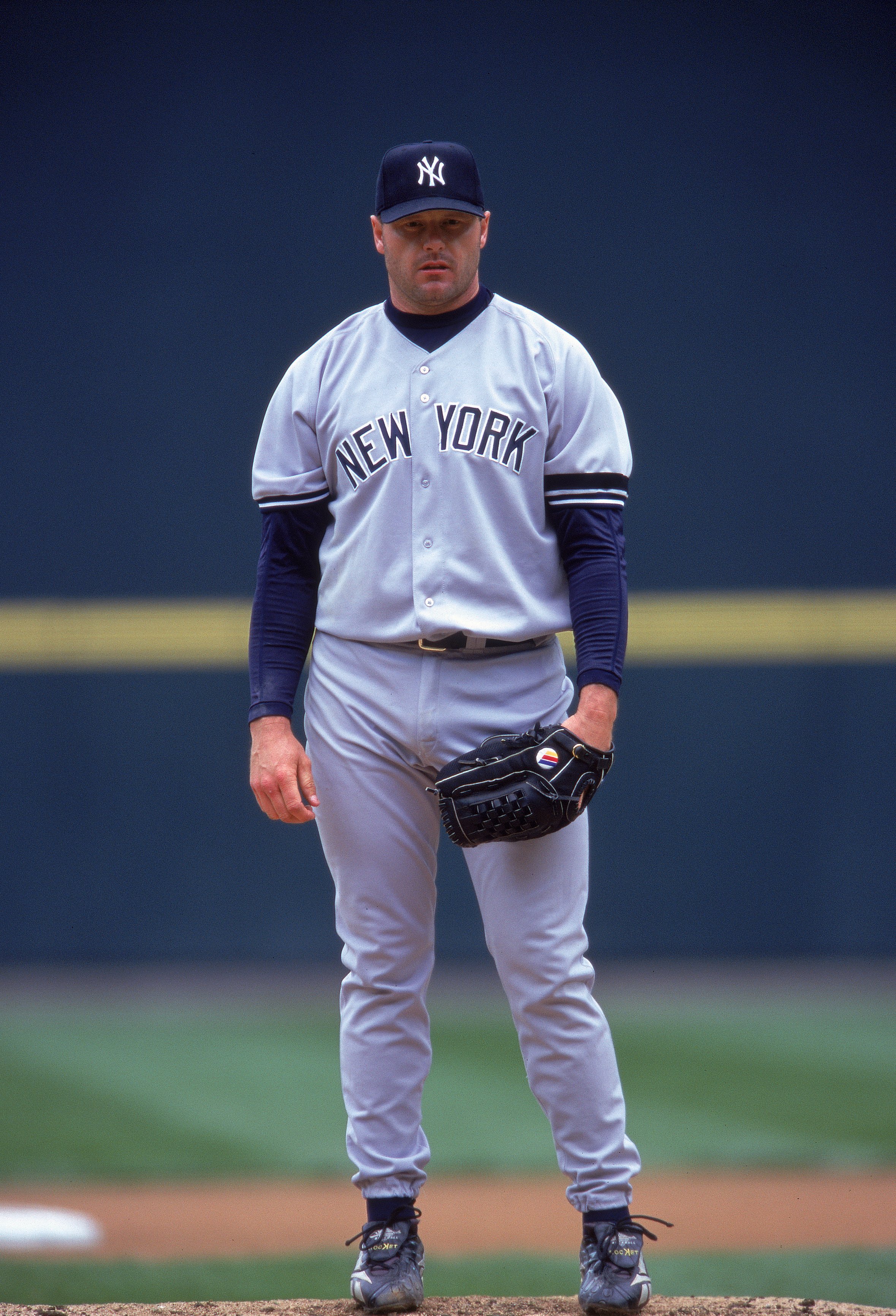
Roger Clemens, the best pitcher of this generation and arguably the best ever, has certainly fallen on hard times since his retirement following the 2007 season.
Since being named in the infamous Mitchell Report as being an alleged steroid user, Clemens has denied such charges on 60 Minutes, been re-accused by former personal trainer Brian McNamee of the same allegations, and subsequently denied them again, this time in front of Congress.
Things got a bit darker for The Rocket last week when he was indicted by a federal court on six counts, most notably two perjury charges, stemming from his denial on Capitol Hill in February, 2008. The grand jury trial is expected to start late this year or early next year and will certainly mar Clemens' legacy even further as it will be dissected every-which-way for weeks and months, regardless of how high-profile his defense team may be.
So with as many milestones surpassed and awards won as any pitcher in history, we should begin to look at some of his accomplishments in lieu of the fact that he may very well have been using steroids.
However, it would be unfair to throw everything he's done under the bus at once, as Clemens has never been accused of taking steroids for his entire career.
Instead, let's take a look at some of Clemens' more memorable moments that fall in the range of his suspected use. For that time table, we will be focusing on the years of 1998, 2000 and 2001, as these are the seasons in which McNamee has testified that he and Clemens spoke explicitly about steroid use and that he even injected Clemens on several occasions.
Considering the fact that a grand jury believes McNamee enough to indict "The Rocket," I'd say we're pretty safe in assuming there is more to his testimony than a scorned trainer trying to make a name for himself.
So in chronological order, here are five of Clemens' most notable moments on the baseball field that are directly in the shadow of his cloud of steroid allegations.
Clemens' 3,000th Strikeout
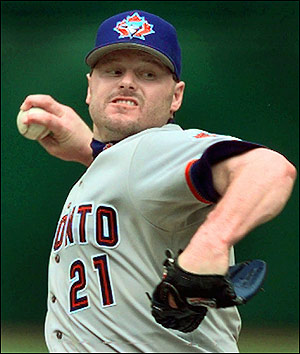
On July 5, 1998, just one month after McNamee first alleges Clemens to have taken steroids, The Rocket recorded his 3,000th strikeout, mowing down Tampa Bay Devil Rays' outfielder Randy Winn.
The 3,000th strikeout is one of the most impressive milestones a pitcher can achieve and has been used to separate some pitchers as being great, as opposed to just very good.
Of the ten Hall of Fame eligible pitchers with at least 3,000 career strikeouts, Bert Blyleven is the only one not in the Hall. And that should end soon, as Blyleven is widely recognized as the best pitcher not currently in the Hall.
Needless to say, your 3,000th strikeout is virtually your ticket to the Hall of Fame. There will soon be an infusion of new Hall pitchers in the 3,000 K club when the likes of Randy Johnson and Greg Maddux become eligible.
While Clemens will become Hall eligible in 2012, the current cloud shadowing his career is likely to become even darker and he could become an an infamous Hall of Fame outcast, such as Pete Rose and Mark McGwire.
Earning the 1998 American League Triple Crown
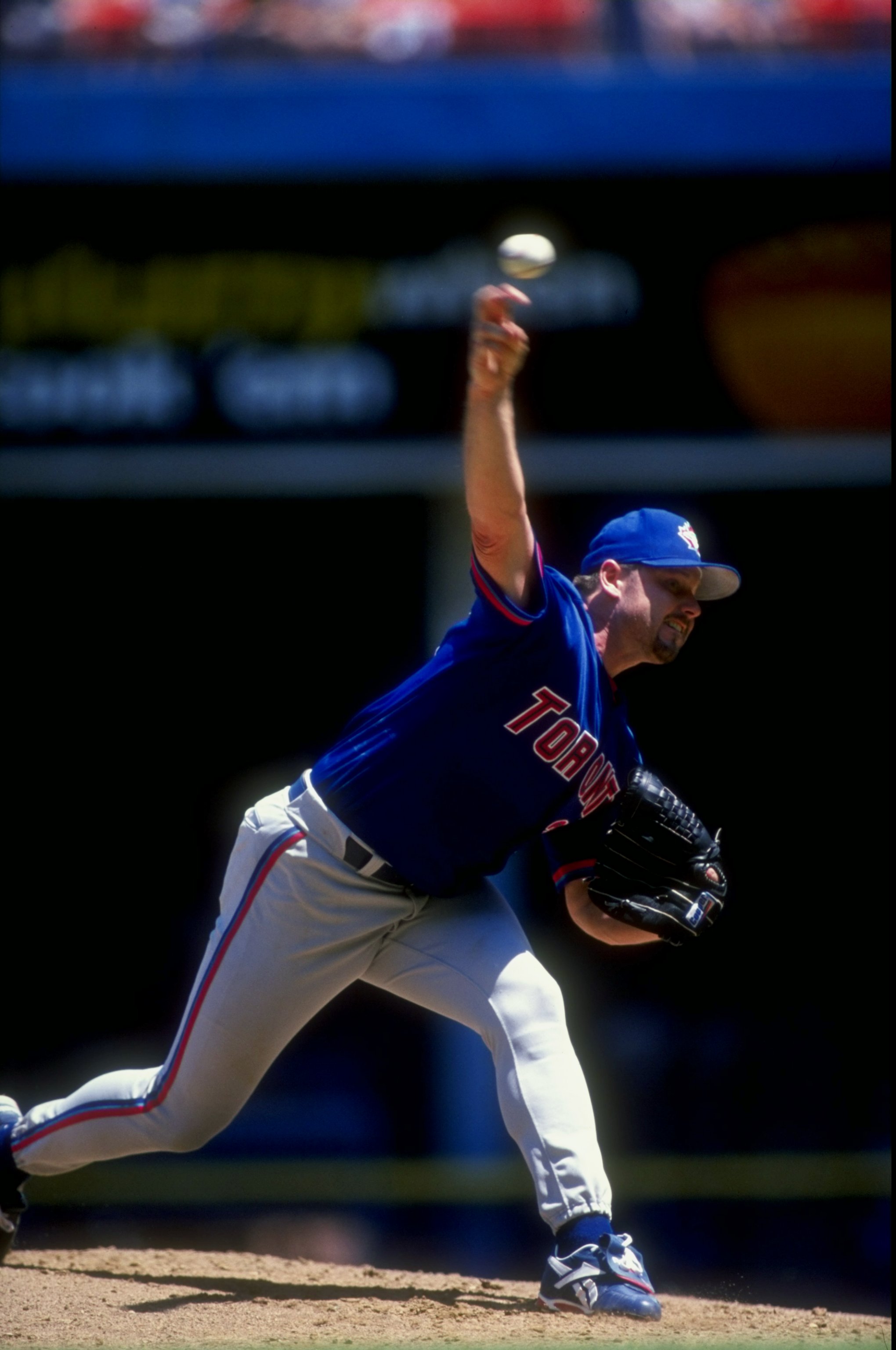
At the conclusion of the 1998 regular season, weeks before Cy Young voting would occur, Clemens earned his second consecutive American League Triple Crown, leading the league in wins (20), strikeouts (271) and ERA (2.65).
The Triple Crown, whether for pitching or hitting, is one of the most elusive and prestigious honors a player can earn. It requires a full season of outstanding performances all across the statistical board, while a pitching Triple Crown has been earned just 21 times in the live ball era (1920 and later), only half of which have been post-WWII.
Having won the Triple Crown in 1997, before any alleged steroid use, Clemens became the first pitcher to earn the honor consecutively since Sandy Koufax won the National League Triple Crown in 1965-66 (and '63, to boot).
Clemens' feat was perhaps more impressive, as the American League features the designated-hitter and therefore one more big-bat that a pitcher must face every game. The only other American League pitcher to win consecutive Triple Crowns is Lefty Grove, who accomplished the feat in 1930-31.
Having earned such an impressive honor, twice in a row, it makes sense that he would take home another piece of hardware to compliment his 1997 Cy Young Award. That's right, we're talking about the...
1998 Cy Young Award, Clemens' 5th of 7
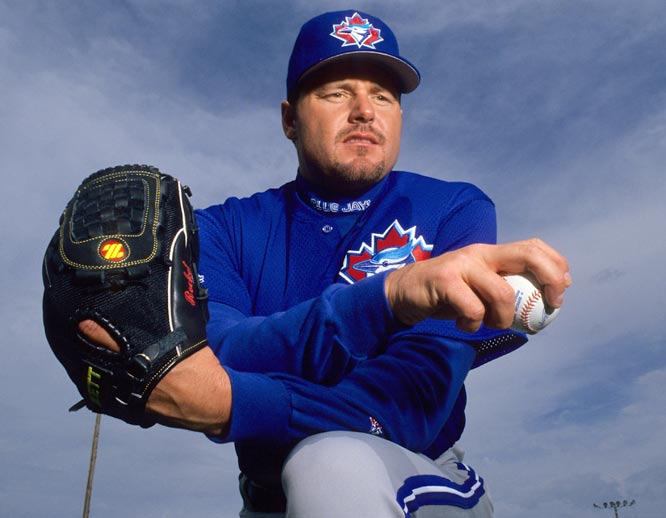
In 1998, having already earned the Triple Crown, it came as no surprise that Clemens won his second-consecutive, and fifth overall American League Cy Young Award.
The Cy Young Award, given annually to the top pitcher in each league as voted on by writers and team representatives, was an absolute no-brainer in Clemens' case, as he earned 100% of the first-place votes.
While you can look at his 1997 season, when he also won the Cy Young and the Triple Crown, and say it was simply the result of a dominant pitcher in the prime of his career, there is still McNamee's testimony that Clemens began using steroids during June, 1998.
McNamee has testified that Clemens began using steroids after a June 8 start vs. the Florida Marlins. After that start, Clemens was 6-6 with an ERA of 3.27.
Clemens would not lose another game that season.
Winning 14 of his next 20 starts, Clemens finished the season at 20-6. Meanwhile, his ERA plummeted to 2.62 by early September, finishing the season at 2.65.
Most suspicious about this season, and surely a point that will be contended throughout the grand jury proceedings, is Clemens' ability to go late into games late in the season. Clemens won his last three starts in the month of August, each of them complete-game shut-outs.
Once again, this could have just been the case of a lock-down pitcher who was completely "in the zone" for several weeks.
Or, according to Brian McNamee, it could be the result of a steroid-user reaping the benefits the illicit drugs were most intended to produce.
2000 World Series, Game 2
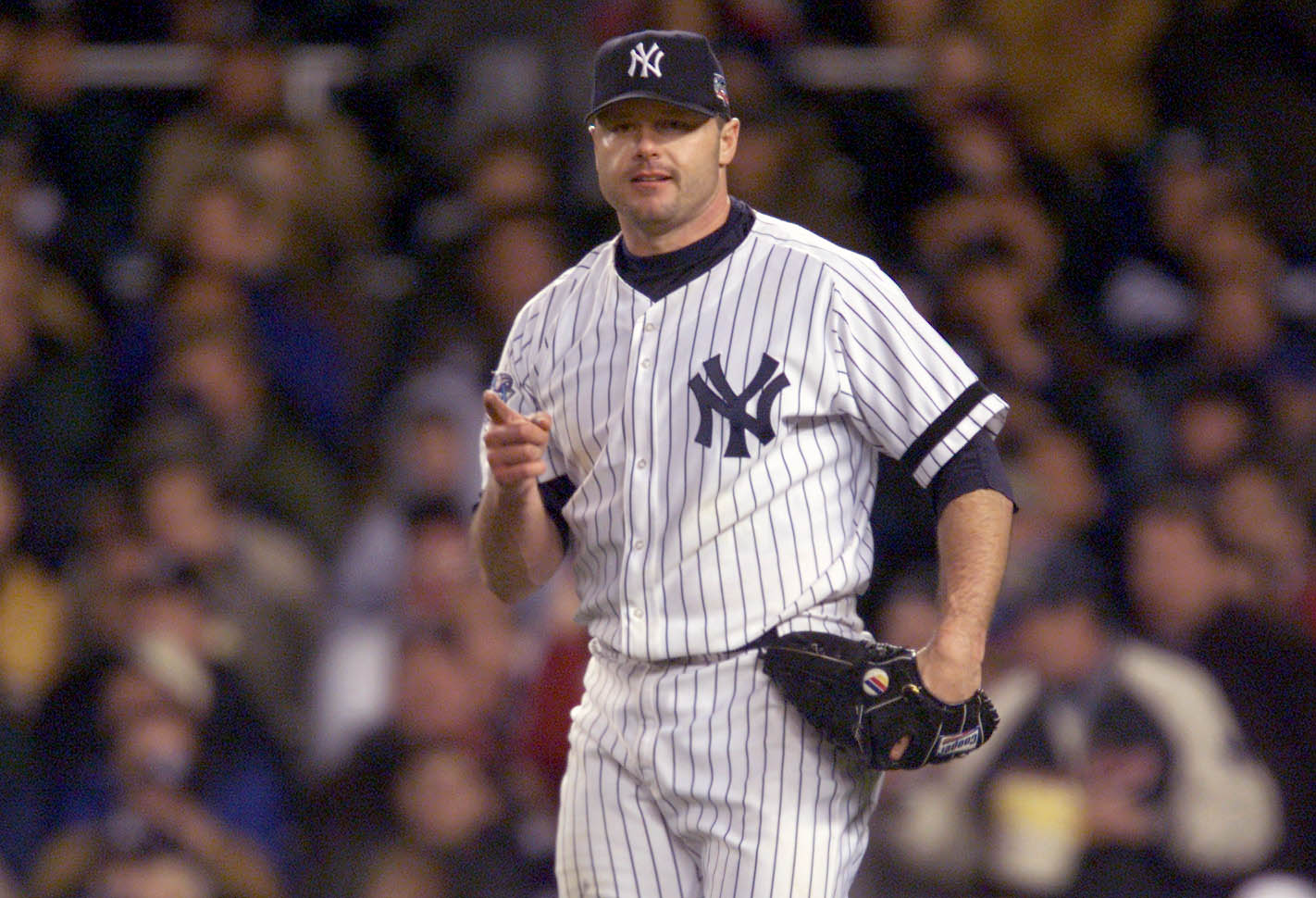
In Game 2 of the 2000 Subway Series against the New York Mets, Clemens pitched his best game of his eight career World Series starts.
On October 22, in Yankee Stadium, Clemens treated the pinstripe faithful to an 8-inning, 2-hit, 9-strikeout showcase of how to defeat the National League Champs. He did not allow a run, and was removed from the game after the 8th, as the Yankees had built a 6-0 lead already.
Though the bullpen came in and allowed 5 runs in the top of the 9th, Clemens still got the win as the Yankees took a commanding 2-0 series lead across town to Shea Stadium, from which the Series would not return.
McNamee has testified that Clemens became interested in using steroids again in the second-half of the 2000 season, and that he personally injected Clemens with steroids and HGH "four to six times."
Indeed, following the All-Star game that season, Clemens lost only two starts, transforming his record from 4-6 to 13-8 by season's end while his ERA dropped from 4.33 to 3.70.
Clemens lost two of his final three starts of the 2000 season as well as his two starts in the ALDS vs. Oakland. He turned it around in the ALCS, however, pitching a complete-game one-hit shut-out of the Mariners in his only start of the series.
While his start against Seattle could have fueled his momentum heading into the World Series, there is certainly a degree of doubt surrounding his stellar outing on October 22.
2001 Cy Young Award, His 6th of 7
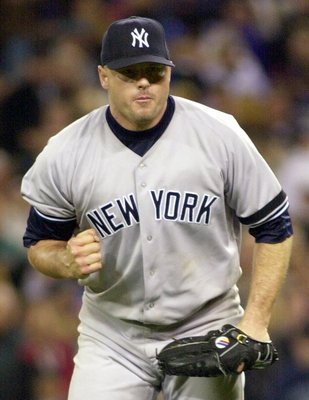
Clemens was on top of the American League pitching totem pole again in 2001, as voters were more impressed by his 20-3, 3.51 ERA season than the 21-8, 3.45 ERA season had by runner-up Mark Mulder of the A's. Earning 87% of the first-place votes, Clemens was a runaway victor for his 6th Cy Young Award, the last he would win in the American League.
Though he ultimately finished with seven Cy Young Awards, winning the National League award in 2004 with the Astros, his sixth (well, arguably his fifth already) supplanted Roger as undoubtedly one of the greatest pitchers of all time. Randy Johnson has the second-most Cy Youngs, with five, but Clemens' record of seven is safe for the time being.
What made this award so notable was the fact that Clemens had now won a Cy Young Award in each of the last three decades, as he won consecutive awards in 1986-87 while with the Boston Red Sox.
McNamee claims that Clemens asked to be injected with steroids in August, 2001. This date seems a bit odd, as Clemens was already having a stellar season. In fact, two of his three losses on the season were suffered in his final three starts. At the same time, his innings-pitched were relatively low, lasting about six innings per start.
But the fact that McNamee's testimony includes the 2001 season as a time when Clemens was using once again casts doubt on the legitimacy of his accomplishments that year.
Clemens certainly had all the tools and statistics to be on track for the Hall of Fame, even before his alleged steroid use began in 1998. Additionally, strict steroid testing run by Major League Baseball began in 2004, helping lend some credence to his Cy Young earned that year in Houston.
However, unless Clemens is fully cleared of all allegations in his upcoming face-off with a federal grand jury, some, but not all, of his accomplishments must be viewed through the lens of knowing that he was using performance enhancing drugs.
How those lenses will affect Clemens' legacy as baseball fans and historians see it has yet to be determined.
It would feel strange, but the greatest pitcher any of us have ever seen pitch may never find his way into the Hall of Fame.